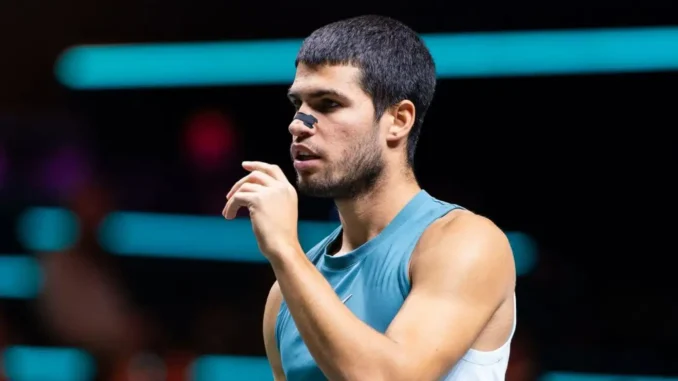
a compelling display of resilience and determination, Carlos Alcaraz, the 21-year-old Spanish tennis prodigy currently ranked world number three, overcame both personal health challenges and a formidable opponent to secure a hard-fought victory at the ABN AMRO Open in Rotterdam. ng Dutch wild card Botic van de Zandschulp, Alcaraz’s performance was a testament to his burgeoning talent and mental fortitude.
e-Match Health Concerns*
Leadi up to the tournament, Alcaraz grappled with a persistent cold that disrupted his training regimen. Refleg on his condition, he candidly shared, “I caught a cold when I was at home, but I’m feeling better every day.” To aid breathing during the match, he opted to wear a nasal strip, a measure he has utilized in the past during similar health challenges. This precon underscores the physical demands of professional tennis and the importance of optimal respiratory function during high-intensity matches.
The Batton Court
The encounter th van de Zandschulp was anything but straightforward. Alcaraz securee first set in a tense tiebreak, edging out his opponent 7-6(3). The Dutchman, hor, showcased resilience, capitalizing on Alcaraz’s unforced errors to claim the second set 6-3. The final set saw raz regain his composure and dominate, ultimately clinching the match with a 6-1 scoreline. This victory not onlrked his progression to the next round but also served as redemption for his earlier loss to van de Zandschulp at the US Open last year.
Post-Match Reflecti
After the match, Alcaraz knowledged that he was not at his peak physical condition, stating, “I’m not feeling 100 percent well yet.” Despite the lingering eff of his illness, he expressed optimism about his recovery, noting that he felt progressively better each day. His ability to perform undech circumstances highlights his mental toughness and commitment to the sport.
Concerns Over Equipment anlayer Health
Beyond his personal health, Alcaz addressed a broader issue affecting the tennis community: the frequent changes in tennis balls across tournaments. He observed, “I think last year e were many injuries, many players with elbow or shoulder issues. Something needs to change.” Alcaraz emphasized the challenges ers face in adapting to different balls and conditions weekly, suggesting that standardization could help reduce injury risks. This sentiment echoes concerns raise other top players, including Daniil Medvedev and Stan Wawrinka, who have also criticized the variability in equipment and its potential link to injuries.
Looking Ahead
With his initial mh behind him, Alcarais set to face either Felix Auger-Aliassime or Andrea Vavassori in the subsequent round. As he continues his campaign in Rotterdame tennis world will be keenly observing his performance and recovery. His journey in this tournament serves as a elling narrative of perseverance, battling illness and a challenging opponent, demonstrating the grit and determination that have become synonymous with his burgeoning career.
A Testament to Resilience
Carlos Alcara journey in the Rotterdam Open sves as a compelling narrative of perseverance. Battling illness and a challenging opponent, he nstrated the grit and determination that have become synonymous with his burgeoning career. As he advances in the tournament, fans and fellow ers alike will look to him as an exemplar of resilience in the face of adversity.
In conclusion, Carlos Alcaraz’s performance at the RO Open in Rotterdam not only underscores his exceptional talent but also his unwavering determination. Facing health challenges and a formidable opponent, he ged victorious, reinforcing his status as one of tennis’s most promising stars. As he progresses in the tournament, the tennis community undoubtedly watch with anticipation, inspired by his resilience and commitment to excellence.
For those interested in witnessing the intensity of the ma,ighlights are available online, offering a glimpse into Alcaraz’s tenacity and skill on the court.
Leave a Reply